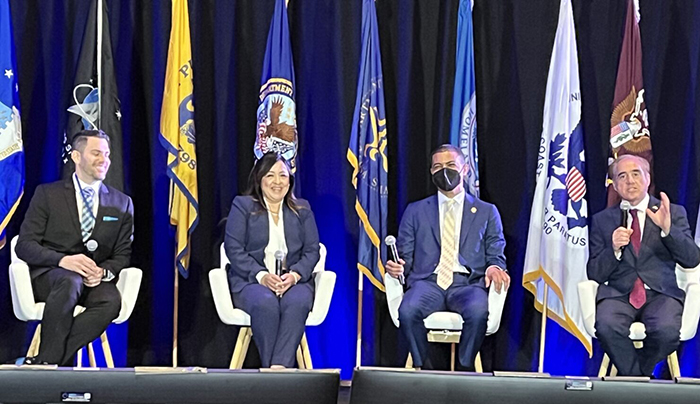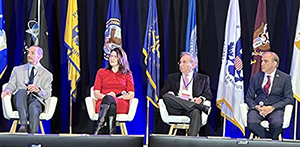Office of Research & Development |
 |
Office of Research & Development |
 |


At the 2024 AMSUS National Meeting experts met to discuss the state of research and health care provided to Veterans with military-related toxic exposures. (Left to Right: Dr. Raul Mirza, Ms. Rosie Torres, Dr. Shereef Elnahal, Dr. David Shulkin.)
February 21, 2024
By Erica Sprey
VA Research Communications
"When you enroll in VA health care, that enrollment means access to care for life."
The Association of Military Surgeons of the United States (AMSUS) hosted a panel discussion on military environmental exposures and the Sergeant First Class Heath Robinson Honoring our Promise to Address Comprehensive Toxics (PACT) Act, Feb. 14, during its annual meeting at National Harbor, Maryland.
The panel session, “Toxic Exposure Impact to Lung Health, Screening, Research, and New Care Approaches,” was moderated by Dr. David Shulkin, the ninth Secretary of the Department of Veterans Affairs, and included Dr. Shereef Elnahal, VA Under Secretary of Health, and Dr. Rachel Ramoni, VA Chief Research and Development Officer.
Other panel members were Dr. Raul Mirza, Defense Health Agency; Ms. Rosie Torres, Burn Pits 360; Dr. Michael Falvo, VA Airborne Hazards and Open Burn Pits Center of Excellence; Dr. Andrea Covey, VA Kansas Lung Screening Program; and Dr. Robert Miller, Vanderbilt University.
Elnahal opened the panel discussion by reviewing the progress VA has made on serving Veterans who experienced toxic exposures during their military service. He said the PACT Act signaled the largest expansion of health benefits for Veterans in generations.

Dr. Michael Falvo, Dr. Rachel Ramoni, Dr. Robert Miller, and Dr. David Shulkin discuss toxic exposure research.
“We knew the advocacy that culminated with the President’s signature on the PACT Act required that VA take the responsibility to make Veterans aware of these new benefits,” said Elnahal. “We conducted more than 2,000 outreach events, collaborating with local [Volunteer Service Organizations], nonprofit groups like Burn Pits 360, and national leaders in this area.”
During the Act’s first year, VA screened more than 4.1 million Veterans for toxic exposures, and delivered more than $1.85 billion in PACT Act-related benefits for Veterans and their families. In FY 2023, Veterans and their survivors submitted 1.95 million disability claims, with more than 843,000 related to toxic exposures, according to the White House.
The VA also implemented a network of specialized providers called the Veterans Exposure Team-Health Outcomes of Military Exposures (VET-HOME) to screen Veterans for environmental health registries and provide follow-up care. The VA has even expanded pay authority to help hire more specialists in environmental medicine, noted Elnahal.
“The PACT Act required VA to bring together different agencies to come up with a strategic plan, but also, it provided substantial funding for us to expand our research on toxic exposures,” said Ramoni.
“Across the entire system, we need to identify those people who have unexplained shortness of breath and then identify those who need different levels of care,” she added. “How do we scale good care when care can be very complex? I think oncology is a good example. Oncology has pathways of care that are available across the country and are standardized.”
The panel also discussed the Individual Longitudinal Exposure Record (ILER), which documents Service members’ environmental exposures over the course of their careers by linking known exposure events to individuals and integrating that information with VA health records. The exposure record includes base camp assessments that evaluate soil, water, and air quality, and the presence of infectious diseases. The goal is to improve all aspects of care provided to Veterans, according to Mirza.
“The ILER will act as a bridge, connecting DOD military exposure information with Veterans’ VA electronic health records,” he said. “It can be a very useful tool for both providers and patients.”
Both DOD and VA track Veterans’ toxic exposures through a number of registries, including Agent Orange, Airborne Hazards and Open Burn Pits, and the Defense Occupational and the Environmental Health Readiness System─Industrial Hygiene, to name a few. Veterans who volunteer to join health registries are monitored for health outcomes and can assist research efforts on toxic exposures and long-term health outcomes, according to My Army Benefits.
As of March 5, 2024, VA is increasing Veterans’ access to care through an expansion of Section 103 of the PACT Act, noted Elnahal. The new criteria for eligibility for VA health care was announced at a VA press conference Feb. 26.
“Here's what that means for Veterans across the country,” said Elnahal. “If you served in Vietnam, the Gulf War, Iraq, or Afghanistan, you can enroll for VA health care. If you deployed to any combat zone after 9/11 or deployed in support of the Global War on Terror, you can also enroll. And even if you never deployed but were exposed to toxins or hazards while training or serving on active duty here at home, you can enroll.
“Even if you don't need this care today, you might need it tomorrow, or the next day, or 30 years from now,” he added. “Remember that when you enroll in VA health care, that enrollment means access to care for life.”
(*Listen to Dr. Elnahal announce the PACT Act expansion at a press conference with the Secretary of Veteran Affairs, the Honorable Denis McDonough. To apply for benefits under the new PACT Act expansion visit www.VA.gov/PACT.)
VA Research Currents archives || Sign up for VA Research updates